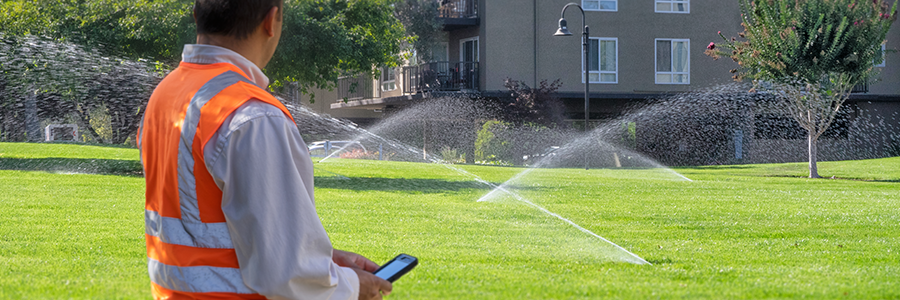
To keep your landscape healthy, your irrigation system must operate efficiently to deliver the right amount of water. An irrigation audit can determine if your system is working properly, and pinpoint where it may need attention.
An irrigation audit performed every three to five years will identify any issues within your system that may need to be fixed or adjusted. This will save you money on sky-high water bills caused by overwatering, prevent costly repairs to your system caused by defective parts, and keep any damages from progressing. Overwatering will oversaturate the soils, drown plant roots, and puddle on the surface, which causes mold and mildew. Underwatering will damage plant health and result in dry or brown areas of grass.
A standard irrigation audit is based on three key factors:
- Inventory: An irrigation specialist will inventory whether plants are grouped in zones according to their specific watering needs. This is vital, since some plants don’t need as much hydration to thrive, and irrigation can be directed towards needier plants, saving water from being wasted and running up the water bill.
- Defective/Malfunctioning Equipment: The irrigation specialist will check your system for any defective parts that are causing sprinklers to run unnecessarily, too long, or not at all. While the rainfall is unpredictable, your metrics don’t need to be. With a Precip sensor, you can start, stop, or pause irrigation based on precipitation data. If sensors are malfunctioning, sprinklers will continue to run even while it’s raining, which can result in massive water waste. Sensors are easy to check and should be done once a year.
- Precipitation: An irrigation expert will perform what’s called a precipitation test to make sure your plants and landscape are getting the proper amount of water to stay healthy. This is an important part of the irrigation audit as it shows how much water is being delivered to each area of your landscape.
An irrigation specialist can also point out ways to conserve water and prevent waste with certain irrigation system improvements:
- Convert overhead spray nozzles to way more efficient drip irrigation
- Use water-saving rotating sprinkler nozzles
- Use weather-based smart irrigation controllers
- Use real-time monitoring that tracks water usage and texts leak alerts
Unseen water waste and leaks in irrigation systems can cost thousands of dollars in water bills annually, and that’s a drop in the bucket compared to the property damage it can cause. Anomalous water usage and leaks in your system can be easily managed with WaterCompass, which will immediately identify leaks and detect unusually high or irregular water usage with text alerts.
An irrigation audit will not only prevent costly damages to your system, but it will also support plant health with more efficient watering, reduce water waste, and save thousands of dollars on water bills caused by overwatering.

